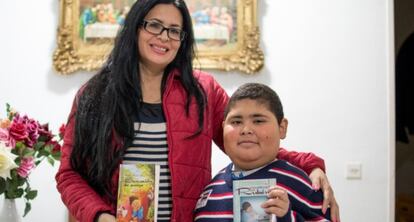Child author who wrote stories to forget rare illness dies at age 12
Rubén Darío Ávalos published four books of stories and one historical novel

In Argentinean writer Jorge Luis Borges’ Autobiographical Essay,the author emphasized his reading as a child and said that at the age of seven he imitated Cervantes’ prose to write his first story. France’s Arthur Rimbaud wrote poems in Latin at eleven and at 15 he won his first important literary prize. The Nicaraguan Rubén Darío was another precocious genius. At the age of eight he wrote sonnets, at 13 his poems were being published in newspapers and at 14 he was offered a scholarship to study in Europe.
He was not a child who fantasized about being a writer, but someone who fought against his illness like Don Quixote
Following in their footsteps was the little Rubén Darío Ávalos Flores, a Paraguayan child writer who died recently in Seville, southern Spain, before he turned 13.
Rubén published four storybooks and a historical novel. They were: Encuentros con Rubén “Encounters with Ruben” (2015); Sensación de puridad “Sensation of purity” (2015); Las Cartas y otros cuentos impredecibles “The letters and other unpredictable stories” (2016); La medicina maestro “The master of medicine (2016); and La diadema “The tiara” (2017). His work demonstrated his love for mythology, horror, science fiction, animals, medicine, travel, history, and comics. Rubén’s literary universe was childlike, but affected by the experience of having suffered with a rare and incurable disease.
Rubén wrote one story after another on a laptop that was more valuable to him than chemotherapy
Rubén was a secret miracle with news of his existence spreading via word of mouth from teachers to doctors to hospital volunteers. That’s how I learned that at Seville’s Virgen del Rocío Hospital there was a Paraguayan boy who talked about Borges, Kawabata, Kipling and García Márquez, while he wrote one story after another on a laptop that was more valuable to him than chemotherapy.
Since Rubén lacked physical defenses, he barricaded himself with books. In one of his stories, the narrator leaves the clinic and visits a bookstore where he looks through beautiful editions of titles including Robinson Crusoe, The Lord of the Rings, Moby Dick, Don Quixote, and Dracula, just to name a few. I bear witness to the fact that Rubén possessed and read all those books and many more.
Rubén was honored at the book fair in La Rinconada, a town just outside Seville, and he participated in the School for Novel Writers in Mollina, in Malaga province. The library in his school was also named after him. In his stories, the children characters fight against harassment, defend animals and protect other children not because they are immigrants, but in the fight for the respect for differences. I do not know what kind of writer Rubén could have been if he had lived to learn more, mature and continue to write. But I can assure you that he was a great child writer and that his books have the “gentle air” of the poem by his namesake, the Nicaraguan writer Rubén Darío.
Rubén published four storybooks and a historical novel
Now that Rubén has died, I think that reading of his epic works should not be limited to other children like him, but should also be undertaken by young people and adults, doctors and teachers, readers and writers, because Rubén fought against all adversities with his eagerness to read, the pleasure of writing and the enthusiasm to learn.
He was not a child who fantasized about being a writer, but someone who fought against his illness like Don Quixote, thanks to reading and writing.
English version by Debora Almeida.
Tu suscripción se está usando en otro dispositivo
¿Quieres añadir otro usuario a tu suscripción?
Si continúas leyendo en este dispositivo, no se podrá leer en el otro.
FlechaTu suscripción se está usando en otro dispositivo y solo puedes acceder a EL PAÍS desde un dispositivo a la vez.
Si quieres compartir tu cuenta, cambia tu suscripción a la modalidad Premium, así podrás añadir otro usuario. Cada uno accederá con su propia cuenta de email, lo que os permitirá personalizar vuestra experiencia en EL PAÍS.
¿Tienes una suscripción de empresa? Accede aquí para contratar más cuentas.
En el caso de no saber quién está usando tu cuenta, te recomendamos cambiar tu contraseña aquí.
Si decides continuar compartiendo tu cuenta, este mensaje se mostrará en tu dispositivo y en el de la otra persona que está usando tu cuenta de forma indefinida, afectando a tu experiencia de lectura. Puedes consultar aquí los términos y condiciones de la suscripción digital.








































